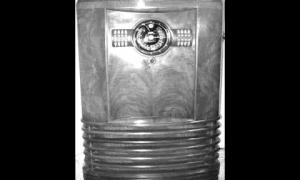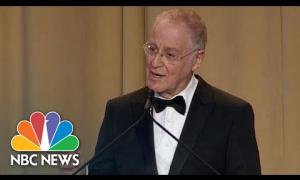The Perennial Demons of Intolerance
January 28, 2015
"Antisemites, radical extremists and religious fanatics ... want to, all over again, strip you of your past, of your story and of your identity."
I want to thank the many survivors along with their family members for being here this evening to share this moment with you. [It’s] incredibly meaningful for all of us and it’s a great great honour for me in so many personal ways. After 53,000 of you gave to our foundation your stories of life and death I feel like I belong to each and every one of you. We all feel that way.
When we are young we have profound experiences which if not detectable at that time serve our initial comprehension of human behaviour and more specifically of pain and of trauma.
I’ve spoken before about how one of my earliest learning experiences, one of my earliest memories, is learning how to read numbers from Holocaust survivors showing me their tattoos when my grandmother and grandfather taught English in Cincinnati, Ohio, to Hungarian survivors, and as a little kid I understood what the numbers were saying, but I certainly could not grasp the magnitude of the numbers, that they were in fact indelible marks of death, unimaginable suffering, unimaginable loss. But I know now that tracing my identity as a Jew is an ever-evolving process.
The learning of the numbers as a child, number one. As an adolescent seeing antisemitism amongst some of my classmates and some people in our neighbourhoods, and then as an adult, coming here to Krakow, Poland, to make Schindler’s List. If you’re a Holocaust survivor your identity as a Jew was threatened by the Third Reich. Your identity is flooded with mortality, [and] unspeakable acts of hatred, but your identity is also one of resilience and an incomparable appreciation of life despite all those who tried to take it away from you.
Your identity is in the courage you have shown in telling your stories. Your identity having trusted me and the Shoah Foundation as the custodian of some of your stories. You’ll survive as long as children can listen to your words, listen to what your eyes are saying, too, and carry your messages in their own futures and into all generations to come. That’s our mission at the Shoah Foundation.Now if you were born a Jew after the Holocaust, like me, your identity can only be fully explored by one’s willingness to acknowledge and embrace it, by your eagerness to find and root out what invoked the Holocaust and what triggered those and many other atrocities in the form of genocide and terrorism. The Holocaust, we understand and respect this, the Holocaust, except for you and maybe even including you, is incomprehensible.
So making Schindler’s List here in Krakow and speaking to survivors, these are the ways I tried to comprehend the Holocaust. When I talked to survivors they told me that thinking of the day when they could be heard, when they could share their own stories and identities, had given them solace. And I’m grateful to these survivors, not only for their bravery in the face of genocide, but because in wanting to help them find their voices, I got to find my own voice, and I got to find my own Jewish identity….
If you are a Jew today, in fact if you are any person who believes in freedom of religion, freedom of speech, freedom of expression, you know that like many other groups we’re once again facing the perennial demons of intolerance. Antisemites, radical extremists and religious fanatics that provoke hate crime—these people that want to, all over again, strip you of your past, of your story and of your identity, and just as we talk about our personal histories and what makes us who we are, these people make their own points. Facebook pages, for instance, identifying Jews and their geographic locations with the intention to attack, and the growing effort to banish Jews from Europe.
The most effective way we can combat this intolerance and honour those who survived and those who perished is to call on each other to do what the survivors have already done, to remember and to never forget.
Taking on this task is an exceptional responsibility.
It means preserving places like Auschwitz so people can always see for themselves how hateful ideologies can become tangible acts of murder. It means sharing and sustaining the testimonies of witnesses so that they can endure for teachers and students around the world their testimonies give to each survivor everlasting life and give to all of us everlasting value. Which brings us to where we are now, the 70th anniversary of the liberation of Auschwitz, and despite the obstacles we face today I feel reassured by our shared efforts to combat hatred. And my hope for tomorrow’s commemoration is that the survivors with us and those survivors from all round the world feel confident that we are renewing their call to remember, that we will not only make known their own identities but in the process help form a meaningful collective conscience for generations to come.
On this anniversary, let’s all be renewed by the knowledge that ours is a just cause and that we will make sure that the lessons of the past remain with us in the present so that we can now and forever find humanitarian ways to fight inhumanity. It’s an honour to be with all of you today.





